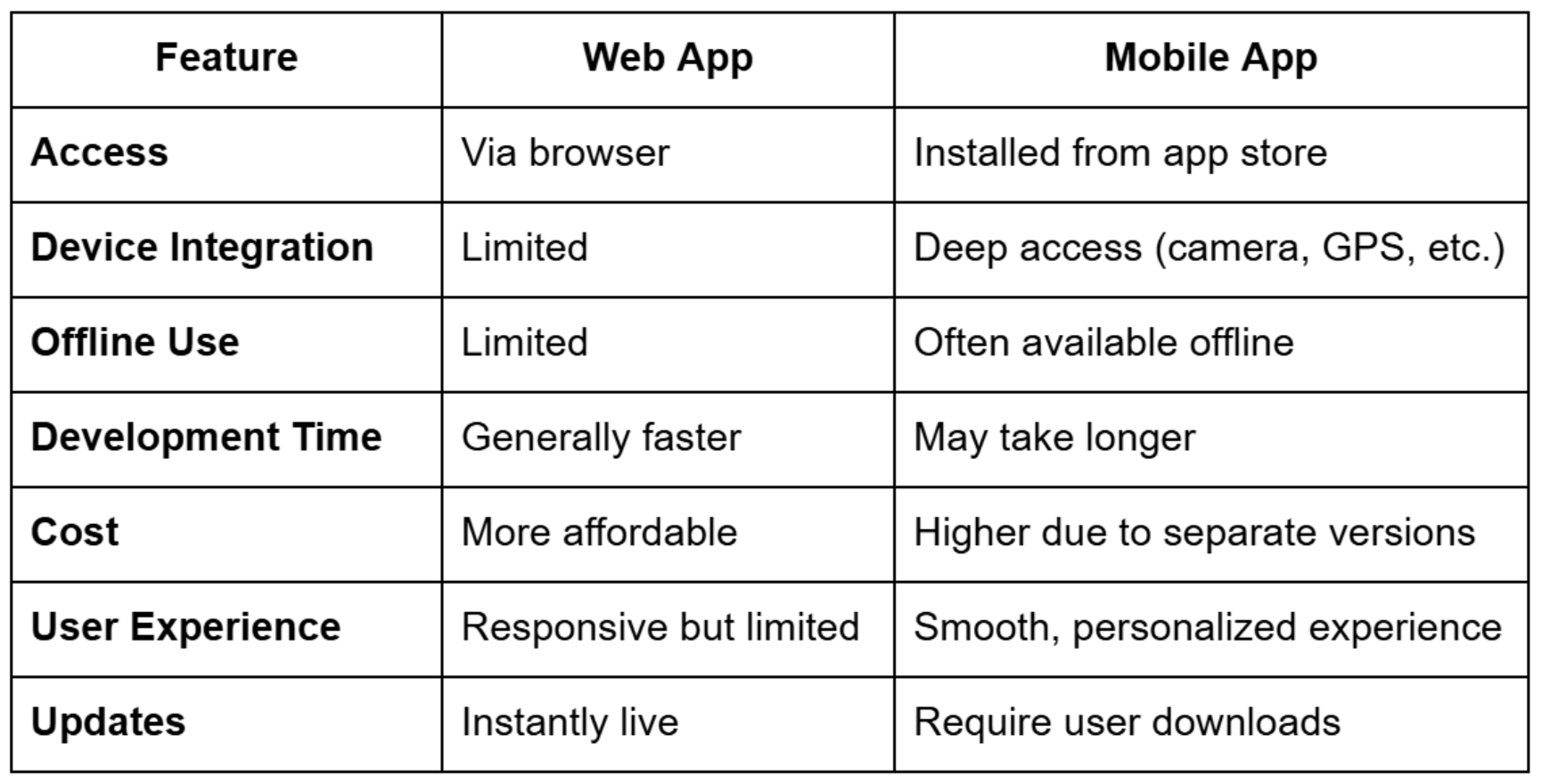How do you shop from Amazon?
Do you use the app on your mobile phone or log into your account on a laptop/desktop browser?
Similarly, how do you use Netflix?
On your phone or laptop?
Chances are you use the platforms both ways. The choice depends on several factors including your mood.
Now, you are able to access these services in both ways because Netflix and Amazon developed both web apps and mobile apps.
With your business, however, you might not want to spend double the money in getting both. Or it might not even be necessary given your audience.
So, if you are faced with an either-or choice, how do you pick between a web app vs. mobile app?
The truth is, both web applications and mobile applications have their unique advantages. And a wrong choice can lead to wasted time, increased costs, and missed opportunities.
That’s why, before you make a choice, it’s crucial to understand how each one works, how they differ, and what they can offer your users.
At SynergyTop, we’ve developed both web and mobile apps for businesses. Our decade long experience has given us deep insights about the two types of app. With that, we now help businesses make technology decisions that align with their goals.
In this article, we will break down the web application vs mobile application debate based on cost, scalability, user experience, development speed, and more.
Read on and make an informed decision in 2025.
What Is a Web App and What Is a Mobile App?
A web app is a responsive application that runs on browsers like Chrome, Safari, or Firefox. Users access it through a URL with no installation required. It’s built using web technologies like HTML, CSS, and JavaScript.
To learn more about web apps, check out:
- How to optimize web app performance
- Building powerful web apps with Node.js
- Why choose ReactJS for web app development
- The benefits of using Angular for your web app
A mobile app, on the other hand, is designed to run natively on smartphones or tablets. It’s downloaded via app stores (Google Play, Apple App Store) and often built using Swift (iOS), Kotlin (Android), or cross-platform frameworks like Flutter or React Native.
To learn more about mobile apps, check out:
Key Differences: Web App vs Mobile App
This side-by-side comparison clearly shows that the web application vs mobile application decision depends on what matters most to your business.

Factor 1: Budget & Time-to-Market
If you’re a startup or business working on a lean budget or tight deadline, web apps can be your ideal starting point. They’re quicker to develop, easier to maintain, and updates are rolled out instantly to all users.
However, if your business model relies on high engagement, real-time notifications, or mobile-first features (like location tracking), mobile apps might offer better long-term ROI despite the upfront investment.
SynergyTop tip: We often recommend clients begin with a web app MVP, then expand into a mobile app once the product-market fit is validated.
Factor 2: Target Audience and Reach
Ask yourself: Where does your audience spend most of their time? If your users are mobile-heavy (like Gen Z shoppers or fitness enthusiasts), a mobile app ensures you’re right there on their home screen.
But if your service is B2B or research-oriented (think dashboards, analytics, SaaS tools), web apps are often preferred for their browser-based accessibility and multi-device support.
Factor 3: User Experience (UX)
When it comes to personalized, fast, and engaging interfaces, mobile apps have the edge. They integrate better with device hardware (camera, push notifications, GPS), work offline, and feel smoother due to native interactions.
Web apps, while responsive, are more limited in terms of native functionalities. However, modern web technologies like PWA (Progressive Web Apps) are narrowing this gap.
SynergyTop insight: For industries like eCommerce or travel, where UX is directly tied to conversions, we often suggest mobile-first development or a hybrid approach.
Factor 4: Maintenance and Scalability
Maintaining and scaling web apps is relatively easier. A single codebase serves all platforms, and updates go live instantly without waiting for app store approvals.
Mobile apps require ongoing updates for different OS versions, device types, and security patches. This means higher maintenance overhead.
Still, mobile apps allow for deeper analytics, more personalized features, and push notification strategies that can scale well with your user base.
Factor 5: Long-Term Business Strategy
If your digital presence is central to your revenue model, investing in a mobile app offers better retention, stronger branding, and higher user loyalty. But for content-driven or support-focused services, web apps deliver value without the app-store friction.
SynergyTop’s approach is to look at your long-term goals. Do you plan to scale globally? Are you looking to integrate AI, chat, or real-time features later? Your roadmap can define whether to go mobile-first, web-first, or hybrid.
What We Recommend at SynergyTop
Rather than forcing a one-size-fits-all answer to the web app vs mobile app question, we analyze your:
- Business objectives
- Audience behavior
- Budget and resources
- Timeline to launch
- Scalability needs
Then, we design a strategy that fits you. Whether it’s a sleek mobile app for your customers or a powerful web app for your backend team, our focus is on building solutions that work now and grow with your business.
Final Verdict: Choose Based on Your Business Goals
The web application vs mobile application debate doesn’t have a universal winner. What matters is what your business needs right now and where you see it going in the future.
If you’re still unsure, talk to our experts at SynergyTop. We’ve helped startups and enterprises across industries build secure, scalable, and high-performance web apps and mobile apps. And we’d love to help you make the right choice too.
Ready to Make the Right Move?
Let’s talk. Whether you’re launching your first app or planning your next big upgrade, SynergyTop is here to guide you with clarity, honesty, and innovation.
















